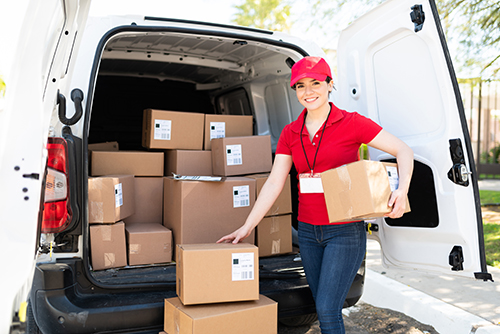Conquering last mile deliveries can be a complex task for fleets, but there are strategies and best practices that can help improve efficiency and effectiveness in this critical stage of the supply chain. Efficient route planning & optimisation is crucial for last mile deliveries. Using advanced routing software and algorithms, fleets can optimise delivery routes based on factors such as distance, traffic, delivery windows, and vehicle capacity. This can help reduce mileage, fuel costs, and delivery times, ultimately improving fleet productivity. Embracing technology can greatly enhance last mile delivery operations. For example, using telematics and real-time communication tools can provide visibility into the location and status of delivery vehicles, allowing for better coordination and communication among drivers, dispatchers, and customers.
In the last mile, the focus should be on providing a positive customer experience. Offering flexible delivery options, such as same-day or time-slot deliveries, providing delivery notifications and updates, and enabling easy returns or exchanges can enhance customer satisfaction and loyalty. Understanding customer preferences and tailoring delivery services accordingly can give fleets a competitive edge.
Efficiently managing drivers and other delivery personnel is crucial for successful last mile deliveries. This includes proper training, scheduling, and performance tracking. Providing handheld devices, mobile apps and optimised routes can assist drivers in navigating routes, managing deliveries, and communicating with dispatchers. Ensuring drivers are well-equipped and supported can improve their productivity, job satisfaction and their own safety.
With increasing concerns about environmental impact, sustainability has become an important consideration for last mile deliveries. Adopting eco-friendly practices, such as using electric or hybrid vehicles and optimising delivery routes to reduce mileage can not only help fleets meet sustainability goals but also resonate positively with customers.
Nick Guise, Marketing Manager at Trakm8 said “Trakm8’s route optimisation algorithms can significantly improve last-mile delivery operations by streamlining the process and making it more efficient. Trakm8’s route optimisation algorithms consider various factors such as delivery locations, vehicles available & vehicle capacities to create the most optimal delivery routes. By optimising the routes, drivers can avoid unnecessary detours and take the most efficient routes, resulting in reduced delivery time. This helps to improve customer satisfaction and ensures that deliveries are made on time. By optimising routes, drivers can minimise mileage and fuel consumption, leading to cost savings for the delivery fleet. This can be especially beneficial in last-mile delivery, where multiple stops are involved, and efficient routing can help reduce fuel expenses and significantly reduce Co2 emissions.
Route optimisation takes into account vehicle capacities, including load capacity and size restrictions. By optimising the routes, the system ensures that each vehicle is utilised to its full capacity, thereby increasing the delivery capacity of the fleet. This helps to minimise the need for additional vehicles and drivers, resulting in cost savings and improved operational efficiency.
Trakm8’s route optimisation is often integrated with a real-time tracking and monitoring system, allowing dispatchers and managers to track the progress of deliveries in real-time. This helps to identify any delays or issues and take corrective actions promptly, ensuring that last-mile deliveries are on track and any problems are addressed in a timely manner.
Utilising route optimisation software can significantly enhance last-mile delivery operations by reducing delivery time, lowering fuel costs, reducing Co2 emissions, increasing delivery capacity, improving delivery accuracy, and providing real-time tracking and monitoring. Conquering last mile deliveries requires a combination of strategic planning, technological innovation, customer-centricity, efficient fleet management, collaboration, and sustainability. By implementing these best practices, fleets can optimise their last mile operations and achieve greater efficiency and success in the final leg of the supply chain.”
To find out more, complete the form below and one of our team will be in touch.


